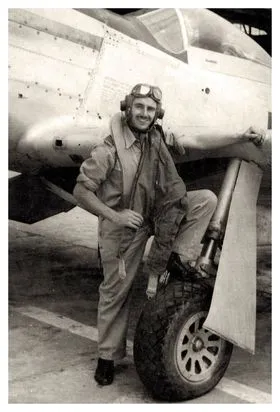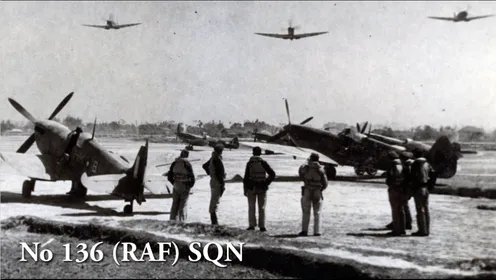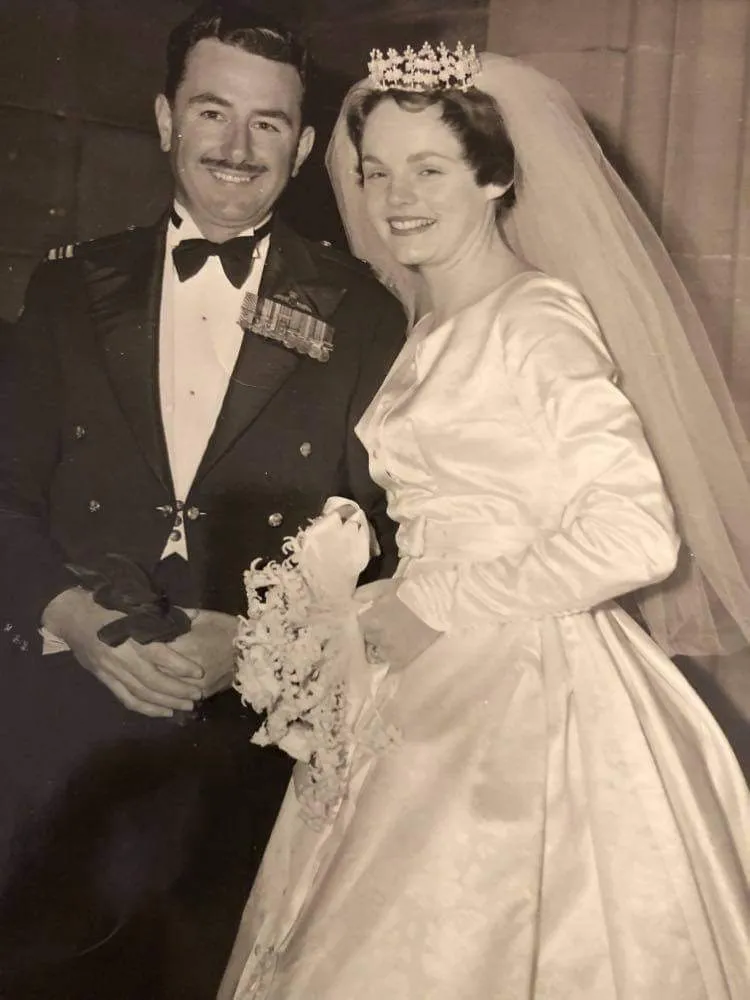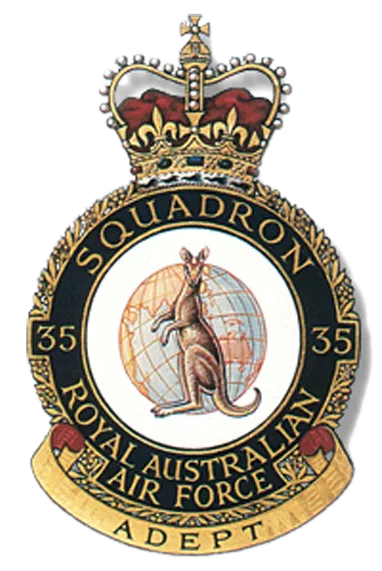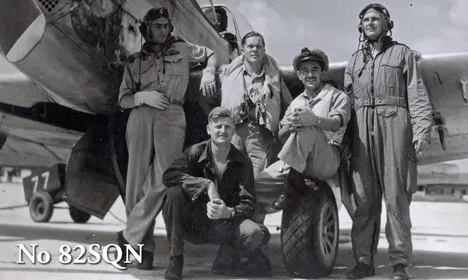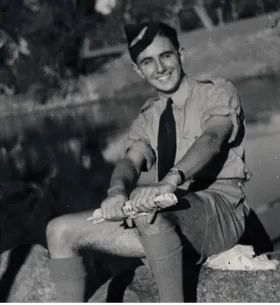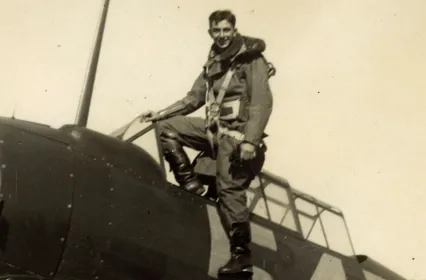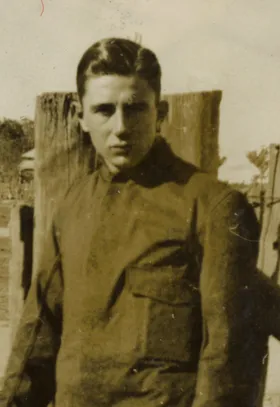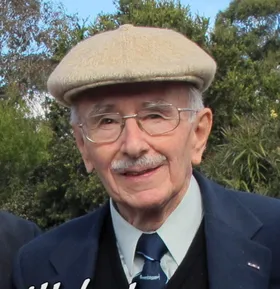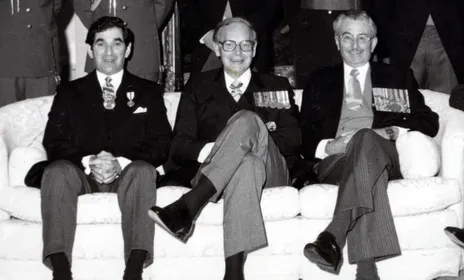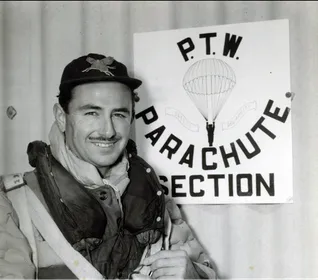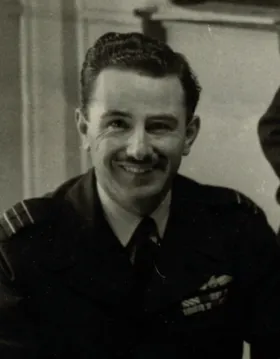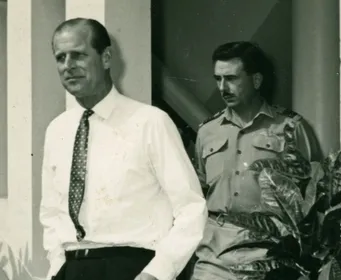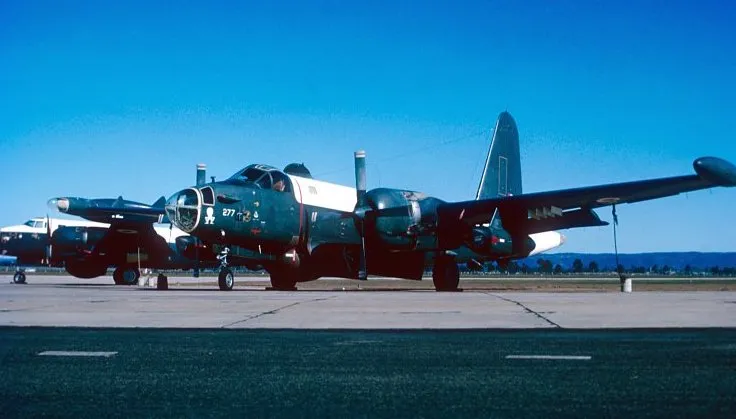GPCAPT Victor Douglas Guthrie
AFC, DFC, AE
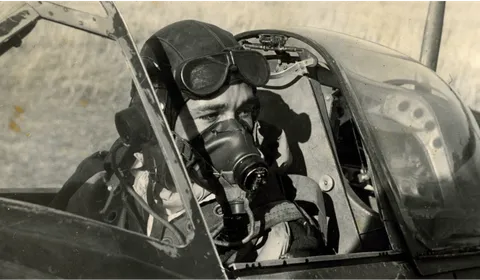


| Squadron/s | 52 OTU RAF 136 SQN RAF 1 EFTS RAF 82 SQN RAF 3 SQN 87 SQN |
| Rank On Discharge/Death | Group Captain (GPCAPT) |
| Nickname | Vic |
| Mustering / Specialisation | Pilot |
| Date of Enlistment | 07 Aug 1941 |
| Contributing Author/s | Judith Guthrie (Daughter) William John Guthrie (Son) Trevor Dean The Spitfire Association 2021 |
Victor (Vic) Douglas Guthrie enlisted in the RAAF at the age of 18 on the 17th of August 1941, qualified as a pilot and was promoted up through the ranks to Warrant Officer.
On the 15th of May 1944, Vic was appointed a Pilot Officer and was then promoted through the ranks to become a Wing Commander on January 1st, 1967.
During the Second World War he completed his operational training in the United Kingdom and was posted to India in 1943, where he saw operational service (Spitfire in Indian livery above).
At the end of the Second World War, Vic was posted to Japan for two years with the Occupational Forces (BCOF). He was awarded an Air Force Cross (AFC) in 1952.
In November 1965 Wing Commander Guthrie assumed command of RAAF Transport Flight Vietnam, (35 Squadron, known as Wallaby Airlines), where he served until July 1966, taking part in many operational missions, and being awarded a Distinguished Flying Cross (DFC).
Group Captain Guthrie served the Royal Australian Air Force with Distinction until the 1st of May 1970.
A Synopsis of Dad's Life as I know It
1923 – 2015
"It is the dash between those years I wish to reflect on here …today."
Dad led a full life, achieving many great feats and accomplishing a great deal for 'a boy from the bush'. Dad was born in Dubbo, New South Wales, in 1923. Growing up, he spent most of his school years in Narromine, a place he generally called 'home'. He was the eldest child of Mary and William Guthrie's two sons, Victor (Dad) and Norman.
Dad's life was pretty much set at a very young age through his fascination with aeroplanes and flying. Regularly after school, heading to Narromine airport, he would seek out and pester the owner of the local joy flight business and bombard him with relentless questions about flying. The owner eventually set Dad's enthusiasm to work cleaning the aircraft, … to quote Dad, "to shut him up". Instead of accepting payment for his work, Dad negotiated a deal with the owner to teach him to fly. This set the tone for the next 30 plus years …
At the age of 17 he left school and worked with the New South Wales Railways as a Junior Clerk, before being 'called up' for service 1941, to join the Royal Australian Air Force (RAAF). You could say that Dad had a hometown advantage, as No. 5 Elementary Flying Training School had taken over Narromine Aerodrome the year before. Dad also trained as a pilot at Forrest Hill, successfully graduating as a Sergeant Pilot, having learnt to fly again, this time, the RAAF way.
In early 1942, saw him sailing for England having been posted to No. 52 Operational Training Unit (52 OTU) to fly Spitfires and Hurricanes.
As his ship sailed out of Sydney Harbour, he and his mates spoke of whether they would ever see their iconic Harbour Bridge again. On completion of his training, he remained at 52 OTU flying Miles Masters and Tiger Moths teaching others.
From here he was promoted to Flight Sergeant (FSGT) and posted to the Royal Air Force of India, where he flew a further 60 hours on Spitfires.
During his time there he also completed a specialist navigation instruction course. Again, on the move, this time to the 1st Elementary Flying Training School (1EFTS), Secundrabad, where he instructed Indian pupils on Tiger Moths and Fairchild Cornells.
November 1943, saw Dad promoted to Warrant Officer (WOFF) and posted to Poona (still in India) to carry out refresher training on Spitfires and Hurricanes. From there he joined No. 136 (RAF) Fighter Squadron for operations in Burma (now known as Myanmar), India and British Ceylon (now known as Sri Lanka) fighting the Japanese.
During his time in India (in 1944) Dad had represented Australia playing "test" cricket against England at the Erwin Stadium in New Delhi. He scored a 100 runs not out. (Just so your aware, during the war years 'Test Cricket' was only played by Serviceman.) He must have impressed someone as later that year he was commissioned and posted back home to Australia.
Once back in Australia, he completed a conversion course on Mustangs at RAAF Williamtown (New South Wales) and at the war's end was sent to Japan to join No. 82 Fighter Squadron, as part of the British Commonwealth Overseas Forces or better known as BCOF, serving in Iwakuni, in the south of Honshu, for the next two years.
But before leaving on this epic journey he again represented Australia in cricket, this time getting bowled out for a duck whilst partnering with the soon to be famous Don Bradman.
In 1947, Dad returned to Australia and after a month's leave, joined No. 3 Squadron flying Mustangs. In 1950, he was promoted and posted this time to No. 87 Squadron as a Flight Commander. During this time with 87 Squadron flying Mosquitoes, his unit photographed the great majority of central Australia. This would have been a long and tedious task, involving many hours of stringent manual flying, in old wooden aircraft that had no autopilot controls.
January 1956, saw Dad selected to carry out parachute training at Abington in England for several months for an eventual posting back in Australia to take command of the Parachute Training Wing at RAAF Base Williamtown. By the time of the end of his reign as the Commanding Officer there, he had completed over 500 parachute descents, many of which were free fall. This was quite an accomplishment for a CO of the unit.
November 1959 found Dad posted to the RAAF Academy at Point Cook in Victoria as Officer Commanding Cadet Squadron. At around this time he started to seriously date a girl named Barbara Harvey (Mum). They met through mutual friends, at the Point Cook flying pageant, where Mum was flying the Tiger Moth that Dad was to parachute from.
Apparently, as the story goes, Dad, 'with his tongue firmly in cheek', assessed Mum's flying prowess during this encounter by telling her: "I liked your RT (radio transmission) work. Your taxiing was good for a novice. Take off and flying were good for … err, well, for a lady pilot, but I don't trust you to land." And with that, he promptly jumped out of the aircraft and raced her to the ground as Mum dashed after him all the way down. They married a year later.
A popular song of the time (although not penned by Frank Sinatra), Dad's favourite song was often sung by him, this being 'Come fly with me'. This tune was well played during the time he and Mum were courting, which seemed quite appropriate.
Mum and Dad got married at St Andrews church in Sydney, (the one near the Queen Victoria building). After the ceremony when they were leaving the church, both Mum and Dad spotted a white Austin Kimberly covered inside and out with all manner of confetti-and-things including half-a-dozen cans on strings attached to the rear bumper. Dad was heard to say "I'd hate to be the poor buggers who own that car" as he escorted Mum to his own pristine white Austin Kimberly parked down the street.
After completing his RAAF Staff College training at Point Cook and with his new wife, they 'experienced' their first posting together to RAAF Base Richmond, NSW. Dad was now with No. 11 Squadron flying Neptune's as the Flight Commander. In December 1961, he was given a sideways move/posting to command No. 22 (City of Sydney) Squadron, which was then a Citizen Air Force Squadron (now called a reserve squadron).
1962 brought the first of Vic and Barb's four 'flower children'. That's me, 'William John'. I was followed by Norman Bruce in '64, Peter Anthony in '67 and, finally, their only daughter, Judith Victoria, in '69.
In early 1965 while ferrying a flight of recently purchased Caribou aircraft back to Australia from 'State side', he had to divert to a small country called Vietnam. There he took over command of the newly formed RAAF Transport Flight for what was initially going to be a short trip away of some weeks, eventually it turned into a year's duration.
During this turbulent time, one of his sons, my little brother Norman, died of cancer in August 1966. Mum had to cope with this on her own because Dad wasn't allowed home 'because he was 'at war'. It was only when Norman was transferred from Sydney to Melbourne Children's Hospital in the last month of his life did Dad get to come home on compassionate grounds. They were tough times back then. One can only imagine the added despair of not having your partner with you through such a time.
During his time in Vietnam, he completed 987 missions and when Dad did come home, I distinctly remember not knowing who he was. Upon his return he was then posted to No. 38 Squadron flying Caribous and DC3s still at Richmond.
On the move again in 1967, Dad posted as the newly appointed Commanding Officer of Base Squadron Darwin saw his family expand with the introduction of Peter. This posting was short lived however, because in 1968 the Guthrie clan was again on the move, this time to Canberra. Dad was posted to the 'Department of Air', this time as the newly appointed Operations Manager for EDP (electronic data processing) and it was here where my sister Judith was born.
For a few years he "bounced around" doing various jobs but in October 1974, Dad joined the staff at Government House as the Works and Finance Officer, one of several roles he had while working there over the next 14 years or so.
Dad worked for five Governor Generals during that tenure. Once again, it was Dad's health that prompted his retirement, a few months short of his 65th birthday.
It was also during this posting that his wartime injuries caught up on him and he was encouraged to move on, as he was now considered an old man at 47. Little did we know, he was only half way there … In May 1970, Dad was discharged from the Air Force medically unfit. Dad was always very proud of the fact that he had reached the rank of Group Captain, having progressed through each of the ranks along the way.
During his "brief" 29 years of service with the Air Force, Dad never lost his passion for flying. He was awarded the following Distinctions:
- DFC – Distinguished Flying Cross
- AFC – Air Force Cross
- AE – Air Efficiency Medal
- American Legion of Merit
- American DFC
- American Air Medal
Breeding budgerigars and playing golf were prominent parts in Dad's life which he pursued more vigorously now with time on his side. He also did part-time work with Legacy, helping war widows and their children. He did this for several years but due to our Mum's reoccurrence of her illnesses and her untimely death in 2000 he resigned from both.
What did Dad mean to me … ? It's hard to condense into a few words here today. To me he was always considerate, always humorous and he was my inspiration. I'm proud to say he was my father. I think he led a full life and enjoyed the adventure along the way.
Come fly with me.

